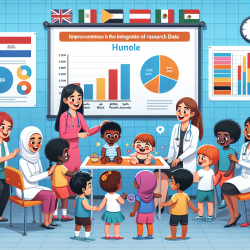Introduction
As a practitioner dedicated to creating positive outcomes for children, staying informed about the latest research and integrating data-driven practices into your therapy sessions is crucial. The research article titled "Measuring availability of and facility readiness to deliver comprehensive abortion care: experiences and lessons learnt from integrating abortion into WHO’s health facility assessments" provides valuable insights that can be applied to improve child therapy services.
Key Lessons from the Research
The research highlights several critical factors that contributed to the successful integration of abortion care into health facility assessments. These factors can be adapted to enhance child therapy services:
- High-Level Commitment: Visible commitment from leadership is essential. In child therapy, this means securing support from school administrators and parents to ensure the success of therapy programs.
- Technical Rigor: Employing robust, evidence-based methods in therapy sessions ensures that children receive the highest quality care.
- Quality Training: Continuous professional development and training for therapists are crucial to stay updated with the latest practices and techniques.
- Data Management: Effective data collection and analysis help in monitoring progress and making informed decisions about therapy interventions.
Implementing These Lessons in Child Therapy
To implement these lessons in your practice, consider the following steps:
- Secure Support: Engage with school administrators and parents to create a supportive environment for therapy programs. Highlight the importance of their involvement in the success of the therapy.
- Use Evidence-Based Methods: Incorporate data-driven techniques and tools in your therapy sessions. Regularly review and update your methods based on the latest research findings.
- Invest in Training: Participate in workshops, conferences, and online courses to enhance your skills and knowledge. Encourage your colleagues to do the same.
- Monitor Progress: Implement a system for regular data collection and analysis. Use this data to track the progress of each child and adjust therapy plans as needed.
Encouraging Further Research
The research article emphasizes the importance of continuous learning and adaptation. As a practitioner, you should not only apply these findings but also contribute to further research in the field of child therapy. Collaborate with researchers, participate in studies, and share your experiences to help advance the field.
Conclusion
Integrating the lessons from the WHO's health facility assessments into your child therapy practice can significantly improve outcomes. By securing support, using evidence-based methods, investing in training, and monitoring progress, you can ensure that your therapy services are effective and impactful.
To read the original research paper, please follow this link: Measuring availability of and facility readiness to deliver comprehensive abortion care: experiences and lessons learnt from integrating abortion into WHO’s health facility assessments.










